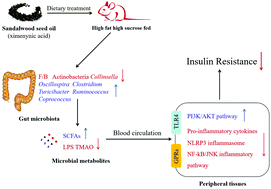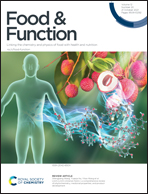Sandalwood seed oil improves insulin sensitivity in high-fat/high-sucrose diet-fed rats associated with altered intestinal microbiota and its metabolites†
Abstract
Sandalwood seed oil (SSO), rich in ximenynic acid, is extracted from the seed kernels of Santalum spicatum. The current work aimed to clarify the potential mechanisms of SSO in preventing insulin resistance (IR) by investigating the intestinal microbiota and its metabolites. Fifty male Sprague-Dawley rats were randomly divided into a standard chow group (N), and four high-fat/high-sucrose (HFHS) diet-fed groups plus 7% of SSO, fish oil (FO), linseed oil (LO) or sunflower oil (SO), respectively. After 12 weeks, the feces were collected and subsequently the rats were sacrificed for collecting blood and tissues. The results indicated that the SSO, FO and LO groups had a lower ratio of Firmicutes to Bacteroidetes (F/B) and lower levels of Actinobacteria phylum in their feces compared to the SO group. HOMA-IR was positively correlated with F/B (r = 0.63) and Actinobacteria (r = 0.64). At the genus level, beneficial bacteria, including Oscillospira, Clostridium, Turicibacter, Ruminococcus and Coprococcus, were more abundant, while destructive bacteria, such as Collinsella, were less abundant in the SSO group than in the SO group. The concentrations of fecal short-chain fatty acids (SCFAs) were higher, and the serum LPS and trimethylamine N-oxide (TMAO) were lower in the SSO, FO and LO groups than the SO group. In addition, SCFAs were negatively (r: −0.45 to −0.82), and LPS (r: 0.12 to 0.42) and TMAO (r: 0.32 to 0.49) were positively correlated with HOMA-IR and serum IL-1β, IL-6 and TNF-α. In summary, the prevention effect of SSO on HFHS induced IR was associated with altered intestinal microbiota composition and the production of microbial metabolites.



 Please wait while we load your content...
Please wait while we load your content...